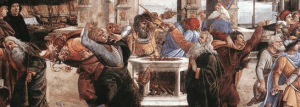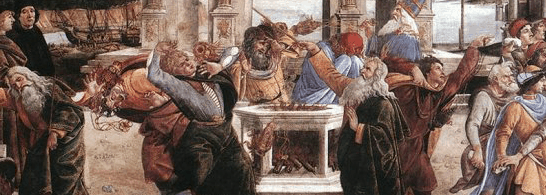Parshat Korach (Numbers 16:1–18:32) — Korach, Datan and Aviram organize a rebellion challenging Moses’ leadership and questioning the granting of the kehunah (priesthood) to Aaron. He is Joinied by 250 distinguished members of the community.
Shorashim Overview and Study Guide
 How do we know they are distinguished and important people?
How do we know they are distinguished and important people?
Moshe falls flat on his face
When has he done that before ?
Why the crestfallen attitude as opposed to Moshe and Aaron standing firm and in prayer against the rebellion?
After arising from the position of “falling on his face” Moshe demands that they put it to a test and everyone agrees to the test of the Incense ( Ketoret) .
Why would that be?
Why were not the rebels concerned as to what the results of such a rebellion may be?
At that point the earth opens up and swallows the rebels, and a fire consumes those that offered the ketoret (Incense)
Punishment by G-d is never for punishment’s sake. What then do these two differing punishments teach us regarding the differing sins amongst the rebels?
The people then clamor against Moshe concerned that their lives would be forfeit
Why would that be?
The result of their complaints and panic, a plague breaks out amongst them and it is stopped by Aaron’s offering of ketoret.
What is the power of Aaron’s offering of ketoret?
Then the people wonder regarding aaron’s leadership and Moshe gathers staffs symbolizing all the tribes and leaves it in the tent overnight and the staff of aaron, gave forth blossoms, sprouted buds, and produced ripe almonds.
Why all those three at the same time as opposed to just producing the fruit?
Why did the staff produce almonds?
Then G‑d commands that gifts from each crop of grain, wine and oil, as well as all firstborn sheep and cattle, be given to the kohanim (priests).
Why command that especially now?
Listen to this week’s podcast:
